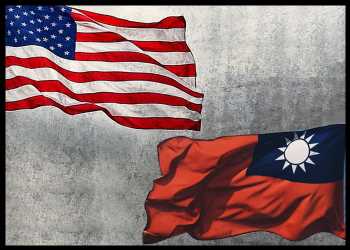US-Taiwan Trade Talks To Begin In Early Fall
The United States and Taiwan have announced plans to begin formal trade negotiations.
The Office of US Trade Representative said that the first round of negotiations is expected to take place early this fall.
The United States and Taiwan, under the auspices of the American Institute in Taiwan (AIT) and the Taipei Economic and Cultural Representative Office in the United States (TECRO), on Wednesday reached consensus on the negotiating mandate for the U.S.-Taiwan Initiative on 21st-Century Trade.
Under the Initiative unveiled in June, the two countries announced their decision to develop an ambitious roadmap for trade talks.
“We plan to pursue an ambitious schedule for achieving high-standard commitments and meaningful outcomes covering the eleven trade areas in the negotiating mandate that will help build a fairer, more prosperous and resilient 21st century economy,” said Deputy United States Trade Representative Sarah Bianchi.
The two sides have set an extensive agenda for negotiations on trade facilitation, good regulatory practices, strong anti-corruption standards, enhancing trade between small and medium enterprises of the two countries, deepening agriculture trade, removing discriminatory barriers to trade, digital trade, robust labor and environmental standards, as well as ways to address distortive practices of state-owned enterprises and non-market policies and practices.
The United States will continue to consult with Congress and key stakeholders like labor, business, environmental groups, and others throughout the negotiations, USTR said in a statement.
The decision to start trade talks met with immediate protest by Beijing. The Chinese commerce ministry said on Thursday that it strongly opposes the proposed trade negotiations. It warned that the Chinese government will take all necessary measures to safeguard its sovereignty, security and development interests.
The United States has no official diplomatic relations with Taiwan, but through the Taiwan Relations Act, has continued selling arms and providing military training to its Armed Forces.
The Act, which was passed in 1979, states that the U.S. must provide Taiwan with the means to defend itself.
Under its One-China policy, the Chinese Government states that Taiwan is part of it. In response to US support for Taiwan, Chinese defense ministry declared in 2019 that “If anyone dares to split Taiwan from China, the Chinese military has no choice but to fight at all costs”.
The decision to start trade talks comes at a time China is annoyed by the controversial visit of House Speaker Nancy Pelosi to Taiwan.
China fired several ballistic missiles into waters around northeastern and southwestern Taiwan within hours of Pelosi leaving the island nation earlier this month.
Source: Read Full Article

